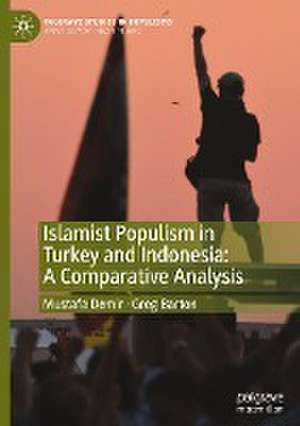Islamist Populism in Turkey and Indonesia: A Comparative Analysis: Palgrave Studies in Populisms
Autor Mustafa Demir, Greg Bartonen Limba Engleză Hardback – 31 dec 2023
Populist movements have adeptly exploited both real and perceived cultural insecurities to acquire, consolidate, and maintain political power. This phenomenon is especially pronounced in flawed democracies and hybrid regimes within Muslim-majority countries, such as Turkey and Indonesia. Notably, religion, specifically Islam, has emerged as a central tool within the populist playbook. Populist actors have constructed a religious-civilizational framework that leverages political binaries, manipulates insecurities, and fosters traditional anti-elite and anti-'other' sentiments.
In this book, the authors advance the notion that populism is a multifaceted phenomenon that relies on various pre-existing fractures within societies and cultures. Once in power, populism intensifies these differences to further consolidate its position, utilizing various state apparatuses such as state-controlled religious institutions. This comprehensive analysis offers insights into the growing trend of populism in the Muslim world and its impact on contemporary politics.
Preț: 724.63 lei
Preț vechi: 883.69 lei
-18% Nou
Puncte Express: 1087
Preț estimativ în valută:
138.68€ • 144.24$ • 114.48£
138.68€ • 144.24$ • 114.48£
Carte tipărită la comandă
Livrare economică 15-29 aprilie
Preluare comenzi: 021 569.72.76
Specificații
ISBN-13: 9789819979790
ISBN-10: 981997979X
Pagini: 158
Ilustrații: XIII, 158 p. 1 illus.
Dimensiuni: 148 x 210 mm
Greutate: 0.36 kg
Ediția:1st ed. 2023
Editura: Springer Nature Singapore
Colecția Palgrave Macmillan
Seria Palgrave Studies in Populisms
Locul publicării:Singapore, Singapore
ISBN-10: 981997979X
Pagini: 158
Ilustrații: XIII, 158 p. 1 illus.
Dimensiuni: 148 x 210 mm
Greutate: 0.36 kg
Ediția:1st ed. 2023
Editura: Springer Nature Singapore
Colecția Palgrave Macmillan
Seria Palgrave Studies in Populisms
Locul publicării:Singapore, Singapore
Cuprins
Chapter 1 Introduction.- Chapter 2 The Story of Democracy, Identity Politics and Populism in the Muslim World.- Chapter 3 The Historical Context: Colonisation and the Emergence of Contemporary Islamist Discourse.- Chapter 4 Decolonisation, the Nation-State and Islamic Movements in Turkey.- Chapter 5 Emergence of Indonesia as an Independent State and Democratic Trials.- Chapter 6 Muhammadiyah, Nahdatul Ulama and Indonesian Nationalism.- Chapter 7 The rise and fall of democracy in Turkey.- Chapter 8 Post-Suharto Democratization and State of Islamist Populism.- Chapter 9 Conclusion.
Notă biografică
Mustafa Demir is a Research Associate and lecturer at the University of Surrey, UK and Associate Teaching Fellow at the University of Derby, UK.
Greg Barton Chair in Global Islamic Politics at Deakin University's Alfred Deakin Institute for Citizenship and Globalisation
Greg Barton Chair in Global Islamic Politics at Deakin University's Alfred Deakin Institute for Citizenship and Globalisation
Textul de pe ultima copertă
This book focuses on the dynamics of democracy and populism in Muslim-majority countries, such as Turkey and Indonesia. It does so by examining the complexities of democratic development in these areas, ranging from 'flawed' to 'hybrid' regimes. Despite the aspirations for democratic progress, recent democracy indices reveal a concerning trend of backsliding, particularly in the last decade. This regression can be attributed, in part, to the ascendancy of populist politics.
Populist movements have adeptly exploited both real and perceived cultural insecurities to acquire, consolidate, and maintain political power. This phenomenon is especially pronounced in flawed democracies and hybrid regimes within Muslim-majority countries, such as Turkey and Indonesia. Notably, religion, specifically Islam, has emerged as a central tool within the populist playbook. Populist actors have constructed a religious-civilizational framework that leverages political binaries, manipulates insecurities, and fosters traditional anti-elite and anti-'other' sentiments.
In this book, the authors advance the notion that populism is a multifaceted phenomenon that relies on various pre-existing fractures within societies and cultures. Once in power, populism intensifies these differences to further consolidate its position, utilizing various state apparatuses such as state-controlled religious institutions. This comprehensive analysis offers insights into the growing trend of populism in the Muslim world and its impact on contemporary politics.
Mustafa Demir is a Research Associate and lecturer at the University of Surrey, UK and Associate Teaching Fellow at the University of Derby, UK.
Greg Barton Chair in Global Islamic Politics at Deakin University's Alfred Deakin Institute for Citizenship and Globalisation
Populist movements have adeptly exploited both real and perceived cultural insecurities to acquire, consolidate, and maintain political power. This phenomenon is especially pronounced in flawed democracies and hybrid regimes within Muslim-majority countries, such as Turkey and Indonesia. Notably, religion, specifically Islam, has emerged as a central tool within the populist playbook. Populist actors have constructed a religious-civilizational framework that leverages political binaries, manipulates insecurities, and fosters traditional anti-elite and anti-'other' sentiments.
In this book, the authors advance the notion that populism is a multifaceted phenomenon that relies on various pre-existing fractures within societies and cultures. Once in power, populism intensifies these differences to further consolidate its position, utilizing various state apparatuses such as state-controlled religious institutions. This comprehensive analysis offers insights into the growing trend of populism in the Muslim world and its impact on contemporary politics.
Mustafa Demir is a Research Associate and lecturer at the University of Surrey, UK and Associate Teaching Fellow at the University of Derby, UK.
Greg Barton Chair in Global Islamic Politics at Deakin University's Alfred Deakin Institute for Citizenship and Globalisation
Caracteristici
Shows emergence of Islamism ideology hosting populism/populist politics in contemporary Muslim majority countries Unpacks the context in which populist movements in the two countries have burgeoned from minor forces to major threat Investigates and maps out Islamist populists’ power bases constituencies and their current positions




